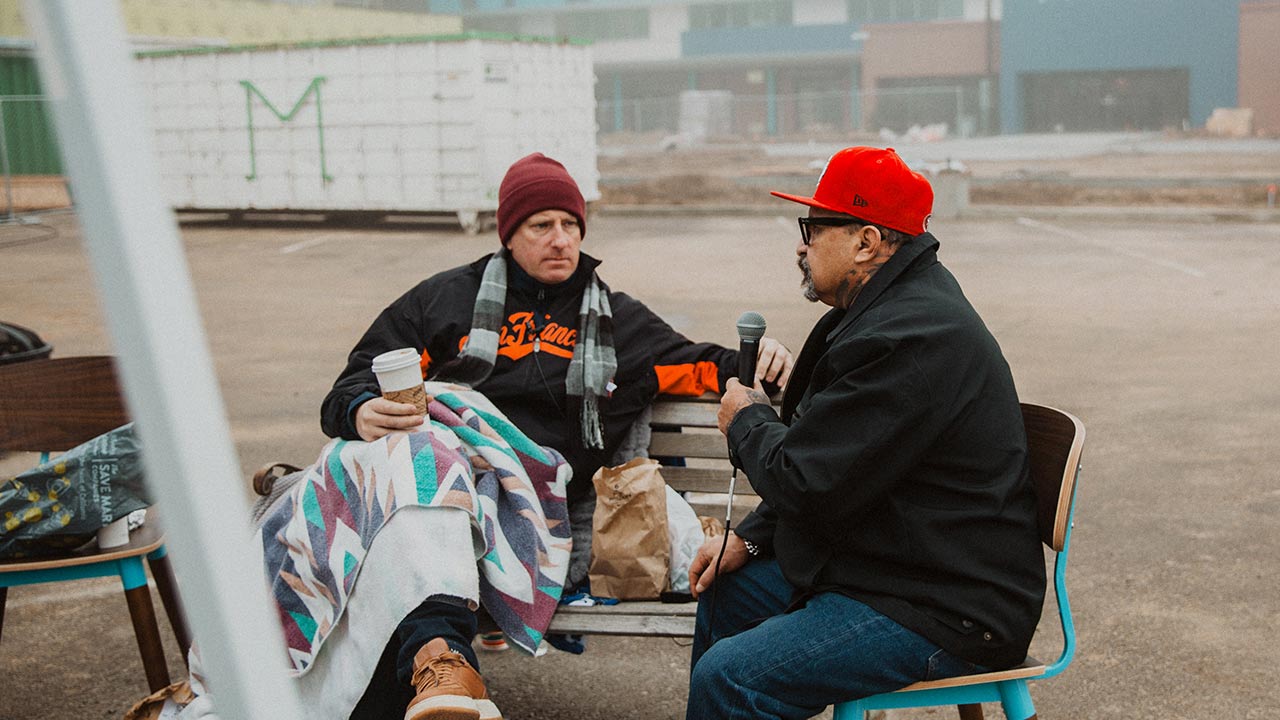Fresno Mission CEO Matthew Dildine, left, talks with a Fresno man about homelessness during Dildine's 24-hour "conversations on a bench." (Fresno Mission)

- Fresno politicians regularly block proposals to move people into affordable housing.
- Special interests send affordable housing costs soaring with "me too" add-ons.
- Many Fresno families are just one setback away from ending up on the street.
Share
|
Getting your Trinity Audio player ready...
|
Several months ago, I sat on a bench for 24 hours and had conversations with people about all kinds of topics but mostly about the needs surrounding housing and homelessness. The interaction that touched me the most was with a young mother with her very young daughter who brought me food. She wasn’t homeless. She didn’t have some addiction. She was just a young mother trying to make it. She told me a tale I hear far too often.

Matthew Dildine
Opinion
Even though she was not behind on her rent, she was given 90 days to move out as the landlord wanted to make “renovations,” a common tactic for landlords when all they want to do is charge more rent. This mother, who had little in savings, couldn’t find a place she could afford. The housing voucher system — which she didn’t need before — is not a quick process. She also needed to make a deposit on a new place but needed her security deposit on the old place she was being evicted from which she couldn’t get back until three weeks after she moved out. She had no idea what she was going to do and yet, even in her distress, was bringing me food.
A couple weeks ago, I heard the same story sitting at a folding table in front of my favorite taco stand in Clovis from an elderly mother with her two adult-age children. They were living in their car behind the local McDonalds having been (illegally) evicted after living in the same apartment for over 10 years. Same excuse. Landlord wanted to do construction. He gave them three days to move out. Somehow the construction was finished in a couple days because someone else was in the following week. The woman told me, they were paying a lot more than she was according to the rental listing.
How Politicians Block New Affordable Fresno Housing
These stories and others add to my frustration when I read what occurred this past week about another housing project that was supposed to provide upward of 90 units (a third of them affordable) in northwest Fresno. It ended like so many other housing plans, on the dumpster pile having been rejected by the Planning Commission after significant neighborhood backlash.
The reasons given were the same. The neighbors were concerned about traffic, placing a multi-family development in an otherwise single-family neighborhood and of course, the big one — it would bring a low-income element to a high income area. Except for the last excuse, I am sympathetic. The location may not be ideal. It might not add to the aesthetic value of the area. If I lived in that neighborhood, I would have also preferred a Dutch Bros., boutique gym, or new pizza place instead of an apartment complex. I get it.
But the fate of this project follows the fate of other projects. Several months ago, the Fresno City Council killed a hotel conversion project that would have provided 60 more affordable housing units because the hotel was not in the right location. I agree. The location was not ideal. Neither is a young mother sleeping in her car with her children.
Similarly, last year we (the Fresno Mission) tried to build Fresno’s first tiny home community. A city council member found a way to kill the project, saying it didn’t provide a healthy environment. Even though the units were beautifully designed, directly attached to a private 4-acre park with plenty of green space and we offered to build a sound wall — something that none of the city-owned shelters/apartments have along Parkway Drive — the project was halted.
I understand that none of these projects are in ideal locations. But therein lies the problem: We no longer live at a time where we can expect the ideal and simultaneously hope to solve our homelessness and housing problem.
In the past two years our city and state have spent more money on housing and homelessness than it ever has before and the problem increased. In the case of California as a whole, it went up drastically. Based on the current trends, we will have over a quarter million unhoused individuals in the next five years. In a decade, Fresno will look unrecognizable. Numbers don’t lie.
The El Salvador Example: Radical Change Required
But possibly more importantly, no longer is homelessness just for those living on the street whose life took a wrong turn because of addiction, mental illness or abuse. The goal line for a healthy sustainable life for normal hardworking Fresenans keeps getting moved. As gas, PG&E, food prices, rent, medical care, and other expenses keep going up there is a growing population of good hardworking people who are right on the edge — one life logistic away from falling into homelessness. This population is growing exponentially by the day or rather by the water and PG&E bills.
That is why I believe if we hope to solve our homeless and housing crisis we need to follow the example of El Salvador. Several years ago, El Salvador was known as the murder capital of the World. With gangs overrunning the Country, El Salvador was experiencing 103 murders per 100,000 people. Today, that rate has dropped to 2.3 murders per 100,000 people, making it the second-safest country in the Americas, only behind Canada.
What did they do? They created radical change. The new president created massive prisons and began swiftly and quickly locking up anyone having anything to do with a gang or murder. Within only a few years’ time, El Salvador’s murder rate dropped by 70%. Correspondingly, the president’s approval rating went above 90%. Apparently, his citizens liked living in a safe country.
Critics attacked the El Salvadorian president, claiming that he locked up innocent people, that the process of getting released from these prisons took too long, and that the prisons themselves provided very poor living conditions.
While I am not a proponent of human rights violations, I did appreciate the president’s response. He didn’t dispute that mistakes occurred or that the process was less than ideal. But, he said the country was in such a dangerous condition, a radical change was needed even if it wasn’t perfect. He chose to make his country safe while acknowledging that mistakes were going to happen because that was a better situation for his people rather than doing nothing and letting people die.

Special Interests Inflate Affordable Housing Costs
When you have a radical problem, it requires radical change. Not tweaks. If we want to solve our housing and homeless crisis we need to be like El Salvador. I am not suggesting that we round up all the homeless and throw them into some facility against their will. That is where the analogy ends. What I am suggesting is that just as El Salvador had to look themselves in the mirror and take an extremely radical approach to the biggest problem facing their country. We also need to look ourselves in the mirror and do the same.
If you expect a perfect plan where everyone will hug and all the housing or shelters will be built in the exact right location, you are wrong. If you think we can cater to special interest groups like the labor unions who want to ensure that only their expensive labor is used or environmentalists that believe people dying on the street is an acceptable condition so long as we use the right light bulb, you are wrong. While these groups represent very valid and important interests, they also cause construction costs to increase, which deceases the number of units that can built. It also increases the rent or mortgage payments. It’s simple math.
Each year our state Legislature will pass a series of laws that will make the ability to build housing more expensive and more cumbersome. These bills will all be made in the interests of the environment, skilled labor, fire safety, or other very good and important causes and yet … they will make everything more expensive and more difficult.
Sure, they will sprinkle in a few new bills that make it easier to build certain types of housing in very specific situations when the appropriate laundry list of bureaucratic requirements are met and when the earth is tilted in the right direction. They will tout what great achievements these are when in reality, their impact is minimal. They will do this while passing a series of other laws that simply make building housing or shelters more expensive and more timing consuming.
$150,000 in Fees per Door of New Construction
There are places in California where municipalities charge over $150,000 in fees per door. The fire code continues to be improvised, substantially adding to the cost of projects. Residential fire sprinklers, trash compactors, emergency radio systems, solar panels, special insulation, Title 24 lighting, school fees, urban growth management fees, trash compactors, rod-iron fencing, new bus stops, 12-foot sidewalks, and other building requirements have been imposed in recent years. All are good things. And, all add to the cost of the project — making housing more expensive and less affordable.
Following El Salvador’s example and applying a radical change to our housing and homeless problem will not be ideal. But neither is living in a country where you are not safe walking to the grocery store or where a young mother trying to make it ends up living in a car.
But here is the No. 1 needed radical change: We have to get to a place where we are willing to sacrifice what is ideal for us as individuals, for what is ideal for someone else who is truly in need. You may not want to see an apartment building on the corner as you drive into your neighborhood. You may not like seeing a homeless person enter or exit a shelter down the street from your kid’s school. You may not like someone who looks a little rougher in your grocery store. But our collective inconvenience can allow us to overcome barriers that are jeopardizing people’s lives.
A critic might say, “Well Matt, that is easy for you to say. These aren’t being proposed in your neighborhood.” While that is true, six years ago I had a fancy office in a fancy law firm on the top floor overlooking the river and I traded it for an office in a modular building overlooking Fresno’s skid row. I have skin in this game.
But perhaps the better argument is not based on what my former career was as a high-priced attorney. My better argument is that the reason I feel strongly about this message is because I have sat on benches with mothers and looked into their eyes as they are telling me they are about to be homeless. Looking at an apartment complex in an awkward location may be inconvenient. Looking into the eyes of that mother is painful. I will take inconvenience over pain any day.
About the Author
Matthew Dildine, a local attorney, is CEO of Fresno Mission, which rescues, restores, and empowers homeless individuals and families. Contact: mdildine@fresnomission.org.
Make Your Voice Heard
GV Wire encourages vigorous debate from people and organizations on local, state, and national issues. Submit your op-ed to bmcewen@gvwire.com for consideration.
RELATED TOPICS:
Categories



















